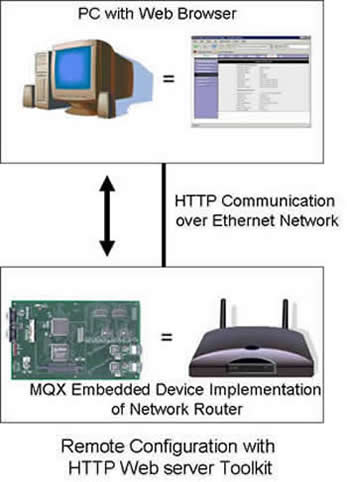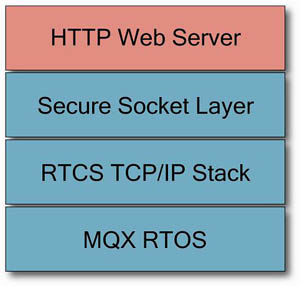The web browser has become the standard interface for configuration of embedded devices that are network enabled. Device developers are using Web technology to create excellent graphically oriented interfaces that enhance product configuration and management without requiring excessive implementation overhead or expensive and inflexible user interfaces.
HTTP Web Server toolkits are available from Embedded Access that are designed specifically for use with the MQX RTOS and RTCS Embedded Internet stack. They use a small amount of resources and are highly portable. HTTP Web Server toolkits include the web server source code and tools for web page creation. The web server allows storage of embedded web pages in RAM, flash, or on disk. It also has capabilities for changing pages dynamically and maintaining dynamic objects. Pages can be protected with password security to restrict both read and write access. The HTTP Web Server toolkits work with RTCS Embedded Internet Stack, MFS FAT file system and MQX RTOS. The toolkits are provided as ANSI-C source code and come in 3 versions: HTTP Basic, HTTP Standard, and HTTP Pro, to suit your web server design and cost requirements. Web security is also available with the IPShield-SSL (Secure Socket Layer) add-on.
The HTTP Web Server toolkits have been tightly integrated with the latest Kinetis, i.MX, ColdFire and Power Architecture processors from NXP and the MQX RTOS, RTCS Embedded Internet stack and MFS file system. They are developed and supported with the CodeWarrior development tools and additional profiling and debugging capability is provided by the powerful MQX Host Tools.
Designed for Embedded Applications
The HTTP Web Server toolkits are designed specifically for the embedded device marketplace. They use a small amount of resources and are highly portable. HTTP Web Server toolkits include the web server source code and tools for web page creation. The web server allows storage of embedded web pages in RAM, flash, or on disk. It also has capabilities for changing pages dynamically and maintaining dynamic objects. Pages can be protected with password security to restrict both read and write access. The HTTP Web Server toolkits work with RTCS Embedded Internet Stack, MFS file system and MQX RTOS.
HTTP Basic
 The HTTP Basic Web Server toolkit is a simple Hyper Text Transfer Protocol (HTTP) engine that serves content to browsers and other Web clients. It is suitable for adding basic web connectivity to an embedded device. It is fully compliant with HTTP 1.0/1.1 specifications, offers superior performance and can be configured to handle thousands of concurrent requests. The HTTP Basic Web Server toolkit also provides access to a high performance CGI-style interface, optional file system support and the ability to dynamically generate HTML giving your engineering team flexibility to design a Web based interface of their choice.
The HTTP Basic Web Server toolkit is a simple Hyper Text Transfer Protocol (HTTP) engine that serves content to browsers and other Web clients. It is suitable for adding basic web connectivity to an embedded device. It is fully compliant with HTTP 1.0/1.1 specifications, offers superior performance and can be configured to handle thousands of concurrent requests. The HTTP Basic Web Server toolkit also provides access to a high performance CGI-style interface, optional file system support and the ability to dynamically generate HTML giving your engineering team flexibility to design a Web based interface of their choice.
HTTP Standard
Building upon the the HTTP Basic Web Server toolkit, the standard toolkit adds the ability to serve web objects (HTML, GIF, JPEG, Applets, etc.) from multiple sources: an optional file system, CGI-style User Exit functions and ROM. Delivered as part of the toolkit, the PageLoader Web-to-C compiler gives your engineering team a powerful tool that simplifies the process of converting Web objects to ANSI-C structures. The generated source is compiled and later linked with the HTTP Standard modules along with your application allowing the Web server to present Web objects directly from ROM. Additionally, The HTTP Standard Web Server toolkit provides the ability to dynamically insert variables into HTML pages served from any source.
HTTP Pro
The HTTP Pro Web Server toolkit is Allegro’s premier web server product offering the widest range of design flexibility. With support for all functionality built into the HTTP Standard Web server, the HTTP Pro toolkit further expands the product feature set giving you unprecedented design flexibility. As part of the Advanced toolkit, the PageBuilder compiler includes all capabilities of the PageLoader Web-to-C compiler with the addition of significant features for compression, integrated variable data access, integrated dynamic content and much more. Additionally, the Web server engine itself offers HTTP Streaming and HTTP 1.1 PUT, OPTION and TRACE support. Advanced Security features are also included with support for Digest Authentication, external password validation and support for an internal security database with dynamic realm and security level configuration. Additional support is provided for state management (URL and HTTP Cookies) in addition to compliance with IETF standards (RFC 2069, RFC 2616, RFC 2617) along with Browser-based file upload support (RFC 1867).
Advanced Web Server Features
Softpages
The SoftPages option provides for storage of HTML pages outside of the program image such as in a file system. This option allows for dynamic changes to the HTML pages in a device without recompilation of the program image.
Remote Host
The Remote Host option provides an integrated HTTP proxy for automatic remote object retrieval from other networked servers. Useful for remote access of Java applets which are too large to store in the embedded device.
Java Graphlets
The Java Graphlets option is a series of Java applets that provide graphic control indicators for the embedded device. The applets include line charts, bar charts, progress bars and dial indicators.
Secure Socket Layer (SSL) Support
 For embedded devices that are connected to the Internet security is always a concern. All of the HTTP Web Server toolkits can support secure HTTP operation with the addtion of the optional SSL component. Advanced security is made possible with integrated TLS 1.0 and SSL 3.0 support that provides a variety of cypher technologies including: RCA, DHE, RC4, DES, 3DES, AES, SHA, CBC and MD5. Because a wide number of cypher suites are provided compatibility with standard secure web browsers is ensured. The SSL plug-in also offers a built-in certificate authority, certificate import support and Basic and Digest Authentication under TLS/SSL. Compliant with IETF standards (RFC 2246 and RFC 3268).
For embedded devices that are connected to the Internet security is always a concern. All of the HTTP Web Server toolkits can support secure HTTP operation with the addtion of the optional SSL component. Advanced security is made possible with integrated TLS 1.0 and SSL 3.0 support that provides a variety of cypher technologies including: RCA, DHE, RC4, DES, 3DES, AES, SHA, CBC and MD5. Because a wide number of cypher suites are provided compatibility with standard secure web browsers is ensured. The SSL plug-in also offers a built-in certificate authority, certificate import support and Basic and Digest Authentication under TLS/SSL. Compliant with IETF standards (RFC 2246 and RFC 3268).
Integrated with MQX RTOS, RTCS and MFS
The HTTP Web Server toolkits were designed to work with the MQX RTOS, RTCS Embedded Internet Stack and MFS FAT file system so there are no integration issue to deal with when using these products together. The HTTP Web Server tookits use the Ethernet or serial drivers from the MQX board support package and RTCS TCP sockets without any modification or additional work. Adding web-based networking to a MQX-based embeddedd device often takes less than a day.